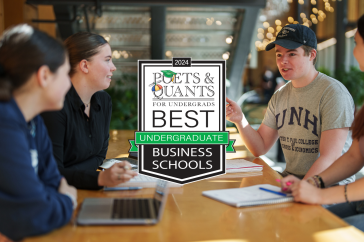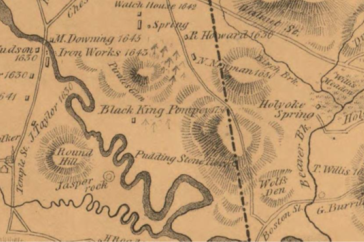
"As you go on to the next chapter in your life look for companionship and advice from those that will expand your knowledge base," said Donald Plante, faculty speaker at UNH Manchester's Honors Convocation on May 17. "It takes people from all disciplines and backgrounds working together to advance our civilization. We as people must be open to learning new things from some of the most unexpected of places."
Plante, lecturer of mathematics, addressed nearly 200 attendees at Tuesday's event, which recognized the academic achievements of more than 70 students.
Plante's address reflected the enthusiasm for and commitment to education that earned him the University's 2016 Excellence in Teaching award. Read his full speech from this year's Honors Convocation below:
Fellow faculty members and staff, parents and friends, and most importantly the students we’re here to celebrate, I want to thank you for giving me the opportunity to speak before you tonight.
To be honest with you, I am also a bit surprised to receive this award given the level of terror that my classes instill in many of my students. I have the privilege of teaching everyone’s most dreaded subject they will encounter in their college studies — math. Unfortunately for me, my most hated subject in school was the one I had to rely on most heavily preparing for tonight — writing. During my years in college I avoided taking classes in language with the same effort that most students apply to avoid taking mathematics. I realize now, mostly while tasked with writing this speech, that this was a mistake.
I once told my students to correct me any time I made a spelling mistake on the board. However, after more interruptions to fix my mistakes than I care to admit, I had to abandon my great experiment and explain to my students that spelling doesn’t matter much when writing an equation. However, even though it is at times embarrassing, when someone uses a word that I don’t know, I stop to ask the person for the meaning behind it. My hope is to someday expand my vocabulary beyond that of a sixth grader. No one, at any stage of life, should be afraid of learning new things. I have found this to be one of the most rewarding parts of life.
Each of you sits here today partly due to the love and support you have received from people who have known you since birth, the people who have taught you so much about life throughout the years. Their wisdom and advice can help you just as much now as you embark on your future. When I graduated from college, there was a brief time that I thought about not continuing my education. I can thank my mother for convincing me to follow my dreams and do what I really loved instead. I loved learning so much that when the time came to enter the real world, what I did instead was become a professional student. At some point I just flipped from sitting at a desk looking up at my professors to standing before the classroom trying to teach students how much fun math could be.
As Eleanor Roosevelt once said, “You gain strength, courage and confidence by every experience in which you really stop to look fear in the face. You are able to say to yourself, ‘I have lived through this horror. I can take the next thing that comes along.’ You must do the thing you think you cannot do.” That last line is worth reflecting upon. She doesn’t say you should do, or may do, but you must do the thing you think you cannot. It is hard for all of us to break out of our comfort zone and explore the unknown, but we can’t let the fear of facing such opportunities deter us. Each of you will be shortly leaving this place to enter the so-called real world. The future each of you faces is yet to be written and will take courage to succeed in.
That brings me to a piece of advice that, although it may seem a bit cliché, I think is extremely valuable. And that is, to always question things and always strive to learn, even in the subjects that you may not most enjoy. Students always ask me the classic question, “When will I use this in my real life?” My favorite way to respond to students when they ask this is to remind them that my class is part of their real life. I assure you that, although you may not be using the quadratic formula in the real world, your skills in problem solving will definitely be tested.
One of my favorite classes I have the honor of teaching has my students explore and present the mathematics that can be found in a subject area that they are passionate about. I love how much I learn from them throughout this class. Students of history have taught me about such things as the mathematics found in the architecture of ancient cathedrals, while computer science students have shown me how math can be applied in games like Minecraft.
With today’s technology, we all have the ability to learn in completely new and accessible ways. Most recently I have become interested in visualizing mathematics through the use of virtual reality and 3-D printing. For the first time in history students can visualize and create real objects that could, until recently, only be shown on a computer screen, and not long before that only drawn by hand. It is through civilization's constant urge to learn and ask questions about problems never even thought of before that these technologies now exist. This brings me to my final point.
It is through all of our hard work together that we may continue to learn and grow. As you go on to the next chapter in your life look for companionship and advice from those that will expand your knowledge base. It takes people from all disciplines and backgrounds working together to advance our civilization. We as people must be open to learning new things from some of the most unexpected of places. As one of the inventors of calculus, Isaac Newton, once said, “If I have seen further than others, it is by standing upon the shoulders of giants.”
So go ahead, stand on the shoulders of those who have come before us, and see if you too can see just a little bit further.
-
Written By:
Kassidy Taylor | Marketing & Communications, UNH Manchester | kassidy.taylor@unh.edu

















































